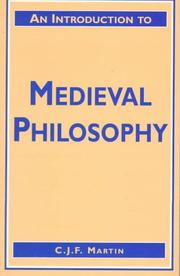| Listing 1 - 6 of 6 |
Sort by
|

ISBN: 0748607900 Year: 1996 Publisher: Edinburgh Edinburgh University Press
Abstract | Keywords | Export | Availability | Bookmark
 Loading...
Loading...Choose an application
- Reference Manager
- EndNote
- RefWorks (Direct export to RefWorks)
History of philosophy --- anno 500-1499 --- Philosophy, Medieval. --- 189 --- Philosophy & psychology Medieval Western --- Philosophie médiévale --- Philosophy [Medieval ] --- History --- Philosophy, Medieval --- Medieval philosophy --- Scholasticism
Book
ISBN: 0197612911 9780197612910 Year: 2022 Publisher: New York: Oxford University Press,
Abstract | Keywords | Export | Availability | Bookmark
 Loading...
Loading...Choose an application
- Reference Manager
- EndNote
- RefWorks (Direct export to RefWorks)
"Is higher education a right, or a privilege? This author argues that all citizens in a free and open society should have an unconditional right to higher education. Such an education should be costless for the individual and open to everyone regardless of talent. A readiness and willingness to learn should be the only qualification. It should offer opportunities that benefit citizens with different interests and goals in life. And it should aim, as its foundational moral purpose, to help citizens from all walks of life live better, freer lives. Using concepts and ideas from liberal political philosophy the author argues that access to educational goods and services is something to which all citizens have a right over a full life. Such goods, it is argued, play a key role in helping citizens realize self-determined goals. Higher education should therefore be understood a basic social institution responsible for ensuring that all citizens can access such 'autonomy-supporting' goods. The book examines the implication of this justification of the right to higher education for questions of educational justice, political authority, distributive justice, civic education, and personal autonomy"--
Educational equalization --- Education, Higher --- Education, Higher - Aims and objectives --- College attendance --- Education and state --- Right to education --- Educational sociology
Book
ISBN: 1856286657 Year: 1994 Publisher: Aldershot : Avebury,
Abstract | Keywords | Export | Availability | Bookmark
 Loading...
Loading...Choose an application
- Reference Manager
- EndNote
- RefWorks (Direct export to RefWorks)
Book
ISBN: 9781786203021 1786203022 Year: 2017 Publisher: London: Geological society,
Abstract | Keywords | Export | Availability | Bookmark
 Loading...
Loading...Choose an application
- Reference Manager
- EndNote
- RefWorks (Direct export to RefWorks)
Book
ISBN: 2857390483 Year: 1996 Publisher: Paris : AFB diffusion,
Abstract | Keywords | Export | Availability | Bookmark
 Loading...
Loading...Choose an application
- Reference Manager
- EndNote
- RefWorks (Direct export to RefWorks)
Book
ISBN: 9780197266489 0197266487 Year: 2018 Publisher: Oxford Oxford university press
Abstract | Keywords | Export | Availability | Bookmark
 Loading...
Loading...Choose an application
- Reference Manager
- EndNote
- RefWorks (Direct export to RefWorks)
This work by Richard Rufus of Cornwall is a major contribution to the history of Western philosophy and the study of Aristotle. Indeed, no future account of thirteenth century philosophical psychology will be able to ignore the contribution of Richard Rufus. Following Aristotle, Rufus addresses questions as diverse as 'how do we reproduce and grow', 'how do we see and hear', 'how do we understand ourselves', and 'how is our immortal soul united with our body?' Its exposition and its questions date from about 35 years before Thomas Aquinas wrote his commentary on On the Soul, so its publication will prompt a re-evaluation of Aquinas's theory of the soul. As the copious notes to this edition indicate, not only is this the earliest surviving commentary on Aristotle's On the Soul taught at a Western University, but it was read by most of Rufus's early successors.
Scholasticism. --- Aristotle. --- De anima (Aristotle). --- Scholasticism --- Aristotle - De anima
| Listing 1 - 6 of 6 |
Sort by
|

 Search
Search Feedback
Feedback About UniCat
About UniCat  Help
Help News
News